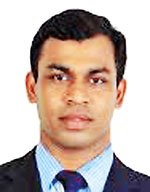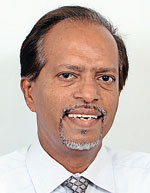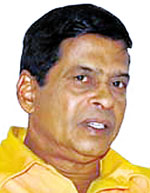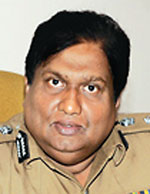Let’s have a peek into the world of WADA
View(s): This is relatively a new concept, never the less, Anti Doping has come to stay. The aim of this perception is to keep sport and its stakeholders clean and keep it above board.
This is relatively a new concept, never the less, Anti Doping has come to stay. The aim of this perception is to keep sport and its stakeholders clean and keep it above board.In the recent past there have been some high profile individuals who have been brought down to earth after the authorities discovered that they used banned substances to enhance their performances. Though, sport itself is a highly commercialised entity at present and the stakes are high. At the same time there are certain individuals who are trying to fight against the norms of this perception.
Let’s go and get a glimpse of what is happening behind the curtain in the World of WADA.
 Dr. Seevali Jayawickreme
Dr. Seevali Jayawickreme
(Director General Sri Lanka Anti-Doping Agency)
It is true that sports has got revolutionised in the modern world. Even so, in the past most of the sportsmen who represented their country did so with passion.
But with time commercialisation spread to a large extent and currently well organised professional sports bodies pay most skilled sportsmen millions to retain them.
As a result there is competition among sportsmen and coaches (along their support staff) to reach the top which has risen due to pressure from their peers.
In this background, those who enter sports with the mere intention of earning money can easily resort to short term methods to achieve their goals by using performance enhancing substances which have been introduced to the market globally in a well organised manner.
These prohibited substances are not registered either as a food or as a drug under the Food and Drug Authority. Hence, athletes who take these substances with or without their intention or knowledge, have to undergo legal sanctions if it is proved by the findings through laboratory testing that these illegal substances prevail in their samples.
The World Anti-Doping Agency (WADA) has imposed a four-year sanction as the first offence and it will be an unfortunate situation as it may ruin his future in sports.
Moreover, there are certain instances in the history of sports that several athletes who had taken or used harmful substances with the specific intention of winning, have even very unfortunately succumbed due to the drug.
When an athlete who represents the country and stands exposed after the laboratory findings that a prohibited substance has been been used, will face disgrace and bring disrepute to the country he represented.
 If this trend is allowed to prevail the equality among competitors will be a great threat to the consistency of sports.
If this trend is allowed to prevail the equality among competitors will be a great threat to the consistency of sports.
The WADA and its stakeholders are fully devoted to this task on the one hand and the locally established National Anti-Doping Organisations (NADOs) on the other hand extend support to this effort.
Due to the attention and vigilance of these organisations it has been abled to control this menace to a certain extent and punish the wrong doers.
The SLADA was established to control, monitor and supervise this process throughout the country and provide awareness about performance enhancing drugs from schoolchildren to international level of sportswomen and sportsmen.
A considerable drop can be seen in respect of reported Anti-Doping Rule Violation cases during the last few years.
The main objective of the SLADA is to eliminate all types of prohibited substances and methods used by athletes. It is not an easy task to achieve this with the modern trends and professionalism which has developed globally in sports.
We, the SLADA always have our eye on the most potential sports which compels athletes to use performance enhancing substances and target more on testing and awareness programmes islandwide through lectures, workshops for sporting community, having hoardings in favour of anti-doping at most of the venues, where sportsmen practise and compete.
The programme which has been initiated by the Ministry of Sports and Ministry of Education to find island-wide talent in different sports from the teenage group beginning in January 2017 will provide us an opportunity to enlighten our potential athletes on the dangers and pitfalls consequent to steroid and performance enhancing drug usage and wean them away and groom them as disciplined sportsmen and sportswomen.
To make it more meaningful, the SLADA with the National Institute of Education (NIE) is planning to include value based education mainly on the prevention and control of Anti-Doping as a topic from Grade 6 to 9 to the subject of Health and Physical Education.
We are also hoping to bring stringent regulations to combat supplements and other nefarious drugs being smuggled to the country which while helping athletes to achieve short term gains but sadly in the the long term ruin their health.
In addition, frequent updates about anti-doping through public lectures, outreach programs at major competition venues and articles through print media, interviews on electronic media and social media will help our sportsmen to compete on their natural strength to achieve their goals by playing clean, rather than getting a suspension for four years.
 Kithsiri Fernando
Kithsiri Fernando
(President Sri Lanka Bodybuilding Federation)
Bodybuilding is one of the oldest sports in Sri Lanka. This sport was first inaugurated in 1948 and now it has completed 68 years. In addition the Bodybuilding Federation is the third sport to be registered with the Sports Ministry. This is a very popular sport in Sri Lanka with Bodybuilding Clubs and Fitness Centres established in every city. The sport is also being conducted among schools at the moment quite successfully. I am totally against the use of prohibited drugs by sportsmen and sportswomen. The use of prohibited drugs will only tarnish the image of the athlete and his country and it will also completely ruin his sporting career. I must appreciate the amount of work carried out by the government and other organisations to bring to an end to this drug menace. But I have some doubt in the manner these tests are carried out by the Sri Lanka Anti-Doping Agency (SLADA). The incident involving Kusal Perera is a clear example as Sri Lankan sportsmen lost confidence in the tests carried out by the Qatar Lab authorities. I think the entire contingent should be tested by the SLADA before the competitors leave for an international tournament. But at the moment the SLADA are carrying out only a random test. I think the Sri Lankan bodybuilders competing in overseas events need not to be tested by the SLADA as all winners in the Asian Games Commonwealth Games and World Championships are tested by the WADA. I have personally met bodybuilders who admit that they actually consume enhancing drugs to maintain their physique. The other fact is that the prohibited drug list announced by the WADA tend to vary from year to year. As a result bodybuilders, coaches and federations have faced a lot of difficulties as the information is passed to them rather late. I think it will be better for the sport it the SLADA takes a decision and start their own sales outlet for drugs which are not prohibited. This will avoid a lot of inconvenience and it will also put the competitors on the right path towards maintaining a clean sport. This could also avert a major disaster as the bodybuilders will always be using the SLADA recommenced drugs for their health. The Sports Ministry, SLADA and all federations should come to a negotiated compromise and start a programme of this nature. I think removing bodybuilding from the National Sports Festival is not the correct way to move forward just because one or two competitors had violated the rules and regulations. The ultimate result will be that the country will be the loser.
 Amal Suriyage
Amal Suriyage
(President Sri Lanka Mountain Biking Association)
Doping in any form is a menace and we have to do everything within our means to root out this from sports in Sri Lanka. The issue is how we are going to do this since its and almost insuperable inclination in both men and women to do whatever it takes to enhance energies in their bodies for superiority over others. The question is have we done enough to educate our sportsmen of the detrimental side of doping.
I am heartened by the fact that the Ministry of Sports has identified this social evil and taken the right step to recognise the Sri Lanka Anti Doping Agency(SLADA), where all sport bodies can use the services free of charge to justify that their players are not using steroids or any banned drugs to enhance their performances.
As a cycling admin, I had known some instances that riders of yesteryear use to take liquor while racing with the bottle of water to effect superior performance. There are instances that currently riders are using banned substances that are not detectable to the naked eye. Take the seven times winner of the Tour De France, Lance Armstrong once popular as a cycling superman, later became the greatest cycling fraud when he acknowledged that he was doping at all the international competitions to enhance his performances.
It is a million dollar question of how he and his Postal Team could avoid detection for seven years. He however has left a legacy of manipulation and shame.
So, how do we define our responsibility as controlling bodies in sports that its players are sans banned drugs? There are high profile sports that are likely needed to be closely monitored like cycling, bodybuilding, boxing, athletics to name a few with periodical doping test made compulsory. As we cannot list any sport exempt from doping test, it is prudent to make all National Championships to come under the doping test.
Even it is not law, as controlling bodies we have a moral obligation to instill in our national players that drugs are only a painkiller and bring a moment of glory and that sportsmen and women must shy away from this than embracing it for manipulating their performances. Besides, the betrayal and harm done to your country have to be borne in mind.
In reality, all sports have become lucrative, and hence competitiveness is very high. Perhaps it now takes thousandth of a second to become a winner. Hence, it is necessary to inculcate discipline and true sportsmanship as the main ingredient in them and not winning by hook or by crook.
Parents, teachers, coaches and media should play a pivotal role in educating the society to embrace true sportsmanship among our players and learn to accept defeat as part and parcel of the game and discourage them from evil ways of winning. Let there be clarity in sports so we can clean up the mess of winning at any cost.
The final analysis is that all sports have changed their priorities since 1994, from conventional medal presentation to cash based prizes making sports a lucrative business.
I remember, in 1989 when Sriyantha Dissanayake won the Asian Games Medal, he was hosted by then President R. Premadasa and at the ceremony few donors collected Rs.100, 000 and gave him which was the biggest cash prize ever donated in the history of sports in Sri Lanka and that was also collected from well wishers and given as a token of appreciation.
But today the prize money has gone up 10 folds but still the guys are not satisfied.
Now things cannot be reversed. Barring the Olympics every other championship has become commercialized and thus the legacy of true sportsmanship is not the criteria anymore and therefore we should protect sportsmanship by educating and effecting stringent controls.
I propose that all sports bodies should have Anti Doping Committees in their associations, run by qualified personnel and field their affiliation to the SLADA and have a common set of guidelines.
 Sunil Jayaweera
Sunil Jayaweera
(Special Consultant Sports, Ministry of Education)
I think bodybuilding should be knocked out of the Sri Lankan Schools Sports Calendar. This sport is ideal for those who are out of school and over-19 years of age. The Ministry of Education will meet in the future to take a final decision on this issue. I see only a handful of schools participating in bodybuilding at the moment. Anyway, schoolboys could compete in major tournaments if the school authorities and the coach take up the responsibilities.
The Education Ministry is also planning to introduce an age limit for weightlifting as well. At the moment schoolboys from Under-15 to Under-19 could compete in these tournaments. We are hoping to do away with these two age categories and introduce a new Under-20 age category for competition. The main reason is to prevent young schoolboys from being physically harassed due to improper coaching methods. We know all weightlifters need to be looked after well with proper nutrition and equipment. The Education Ministry cannot focus on all these requirements as it will cost the ministry quite a big amount. Also, schoolchildren are unaware about the danger of using illegal drugs.
There is a danger that these schoolchildren could fall into the trap and consume energy boosting drugs. Another danger is that these players are coached by outsiders and these outside coaches are keen to see their students come out victorious at any cost. I think the Principal, PTI Head and the coach should be educated on the danger of providing enhancing drugs for their students. The Anti-Doping Agency should take the entire responsibility over this issue. We have come across several occasions where some of the outstanding athletes at school level have been a complete failure after they had left school. This has brought a huge doubt about their performances in some of the school meets. I would also see there are three other reasons for their failure after leaving school. One of them is because due to employment commitments, second is the lack of nourishment, third reason is the addiction to some indecent behaviour. I think the non-availability of doping test at school level has been a major issue for this crisis. This should be handled by the Anti-Doping Agency. Athletics, bodybuilding, boxing, weightlifting and rugby are the sports that have been badly hit by the doping menace.
 Priyantha Jayakody
Priyantha Jayakody
(Deputy Inspector General of Police Crimes and Criminal Intelligence and Vice-President
Sri Lanka Beach Volleyball Association)
I think this drug menace should be completely eradicated from all sports instead of trying to remove the sports events from the National Sports Festival or the the All-Island School Games. This drug menace has spread not only in Sri Lanka but also throughout the world. The main reason for this I believe is because of the high stake and the huge prize money. In the past the winners of Olympic Games were presented with souvenirs. But today we see the competitors battling for prize money instead of the gold medals. I can remember the Sri Lanka 400X4 metres Gold Medal winning Relay Team in Tehran in 1974 (W. Wimaladasa, Sunil Gunawardena, Kosala Sahabandu and A. Premachandra) did not receive huge cash awards. Sports have now become one of the main business sectors in the world. The number one business in the world is weapons. The number two is drugs and the number three is sports. Sports are dependent mainly on huge backing from the sponsors. The situation is so bad that sports have turned out to be non- sporting events due to pressure from various financial organisations. I also see the sports administration has overtaken the competitors. But the real fact is that the administrators do survive mainly because of the competitors. As a result these administrators are very keen to take credit with the performances of the athletes. I see this as a short cut to reach the highest position in the administration. I think we should have a national policy if we are to eradicate this drug menace. The Sports Ministry, Sports Federations, the Department of Sports Development and the Anti-Doping Agency should join together to make this a successful campaign. In addition all sports associations and federations should change their Constitution and should include Anti-Doping into the system. The Sri Lanka Volleyball Federation have already included a paragraph on Anti-Doping. The Constitution under 29.6 reads as follows: “Each NF taking part in international competitions must have, in close cooperation with the national authorities concerned, and out – of competition anti-doping testing programme in accordance with the World Anti Doping Code published by WADA (World Anti – Doping Agency).”
I am totally against the decision to remove bodybuilding from the National Sports Festival. This is unfair for those competitors who participate honestly with a clean record. I can remember the cricketers of the Sri Lanka Team which toured South Africa in 1982 were banned for 25 years. This was a big setback for the game in the country. I doubt whether the move to ban the cricketers for 25 years was the correct decision taken at that time. We can suspend players, sports and associations but it is very difficult to lift them up to a good standard.


